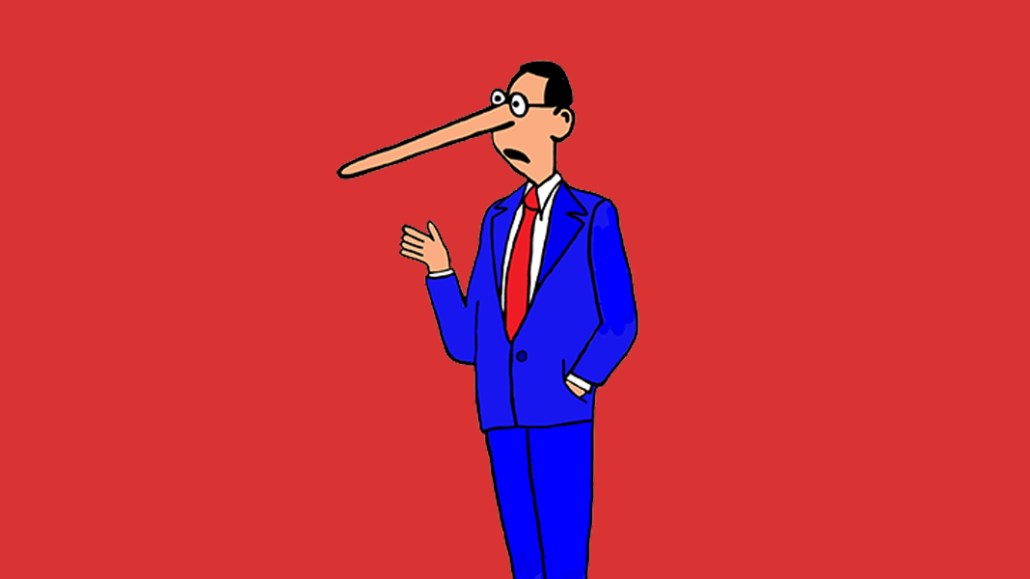Last chance to save on Digiday Publishing Summit passes is February 9
‘It’s everyone’s problem’: Google touts commitment against ad fraud

This article is a WTF explainer, in which we break down media and marketing’s most confusing terms. More from the series →
Google invited about 200 people to its New York offices on Sept. 18 not to share news or directly tout its own greatness, but rather to explore the state and the future of ad fraud. Though, indirectly during the two-hour event, the tech giant boasted about its commitment to transparency and the need for others to step up.
“[Ad fraud] is everyone’s problem. We have to work together on this,” said Payam Shodjai, Google’s director of product management, after the event.
Google’s push to be seen as an industry leader in transparency on ad fraud comes as it faces concerns from vendors in it handling of General Data Protection Regulation and brand safety issues still persist on YouTube. Google, one of the largest networks of digital advertising, says ad fraud is a battle that requires far more communication and cooperation. Google has 120 employees exclusively working on ad fraud, Shodjai said.
In attendance at the event, co-hosted with cybersecurity company White Ops, were marketers, agencies, publishers and advertisers. During a presentation titled Ad Fraud 101, White Ops cofounders Tamer Hassan and Michael Tiffany said that while others describe ad fraud protection as a game of whack-a-mole, they don’t see it as impossible to beat. Rather, there is a solution: Destroy the incentives for fraudulent practices.
“It’s a hard effort, continuous fight, but it’s not an endless game of whack-a-mole that can’t be won. That’s because we can target economics,” Hassan said. “A lot of security doesn’t get to the heart of the problem which is about incentives. For some, the job is about protecting things but all that does is change who the victims are.”
Indeed, while the proliferation of fake news also has been described as a similar game of whack-a-mole, Facebook also has been working to curb its spread by trying to eliminate the incentives to those types of publishers. For Google’s Shodjai, the game of whack-a-mole exists only if there’s not collaboration. Google has been promoting the adoption of ads.txt, which executives say has reached a “critical mass,” for example.
Google, for its part, is the only digital platform to be certified, or in the process of certification, in every section of an audit by the Media Rating Council, as revealed in a slide from Bill Tucker’s of ANA and Louis Jones’ of 4As joint-presentation. Those categories are viewable pipeline, vendor integration, sophisticated invalid traffic, 3rd party audience and brand safety.
Still, there are changes in behavior that can’t be predicted and platforms that are more difficult to implement solutions like ads.txt. Emily Kennedy, group director of trading at programmatic platform Amnet, said protection on mobile apps has been more difficult to guarantee. Some of that is a delay in the mobile app stores adopting ads.txt.
“Mobile app has always been the exception, data is limited there. For a lot of our advertisers, those other limitations are preventing us from buying mobile app even though we would like to be there,” Kennedy said.
Google’s Shodjai said his team is currently prioritizing mobile, but they’re also looking to other digital platforms.
“The space is getting close to being finalized. We’re leveraging the existing app store inventory to plug into that, and then there are newer channels, like audio, digital out-of-home, connected TV. They’re major areas of growth for the entire market but we’re figuring out to make that inventory clean,” Shodjai said.
More in Marketing

In Q1, marketers pivot to spending backed by AI and measurement
Q1 budget shifts reflect marketers’ growing focus on data, AI, measurement and where branding actually pays off.

GLP-1 draws pharma advertisers to double down on the Super Bowl
Could this be the last year Novo Nordisk, Boehringer Ingelheim, Hims & Hers, Novartis, Ro, and Lilly all run spots during the Big Game?

How food and beverage giants like Ritz and Diageo are showing up for the Super Bowl this year
Food and beverage executives say a Super Bowl campaign sets the tone for the year.








